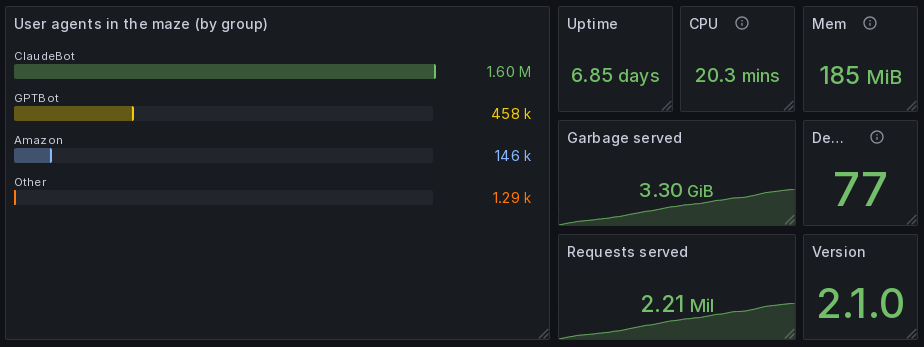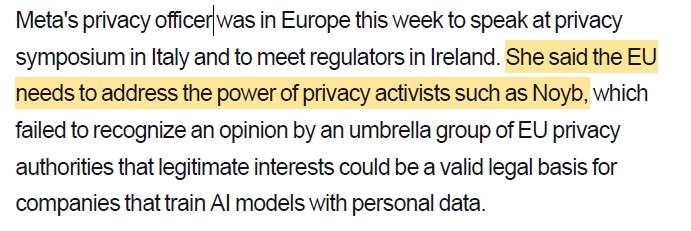Posts
157Following
385Followers
310Fabio Manganiello
fabio@manganiello.socialWhy Bell Labs worked so well, and could innovate so much, while today’s innovation, in spite of the huge private funding, goes in hype-and-fizzle cycles that leave relatively little behind, is a question I’ve been asking myself a lot in the past years.
And I think that the author of this article has hit the nail on its head on most of the reasons - but he didn’t take the last step in identifying the root cause.
What Bell Labs achieved within a few decades is probably unprecedented in human history:
They employed folks like Nyquist and Shannon, who laid the foundations of modern information theory and electronic engineering while they were employees at Bell.
They discovered the first evidence of the black hole at the center of our galaxy in the 1930s while analyzing static noise on shortwave transmissions.
They developed in 1937 the first speech codec and the first speech synthesizer.
They developed the photovoltaic cell in the 1940, and the first solar cell in the 1950s.
They built the first transistor in 1947.
They built the first large-scale electronic computers (from Model I in 1939 to Model VI in 1949).
They employed Karnaugh in the 1950s, who worked on the Karnaugh maps that we still study in engineering while he was an employee at Bell.
They contributed in 1956 (together with AT&T and the British and Canadian telephone companies) to the first transatlantic communications cable.
They developed the first electronic musics program in 1957.
They employed Kernighan, Thompson and Ritchie, who created UNIX and the C programming language while they were Bell employees.
And then their rate of innovation suddenly fizzled out after the 1980s.
I often hear that Bell could do what they did because they had plenty of funding. But I don’t think that’s the main reason. The author rightly points out that Google, Microsoft and Apple have already made much more profit than Bell has ever seen in its entire history. Yet, despite being awash with money, none of them has been as impactful as Bell. Nowadays those companies don’t even innovate much besides providing you with a new version of Android, of Windows or the iPhone every now and then. And they jump on the next hype wagon (social media, AR/VR, Blockchain, AI…) just to deliver half-baked products that (especially in Google’s case) are abandoned as soon as the hype bubble bursts.
Let alone singlehandedly spear innovation that can revolutionize an entire industry, let alone make groundbreaking discoveries that engineers will still study a century later.
So what was Bell’s recipe that Google and Apple, despite having much more money and talented people, can’t replicate? And what killed that magic?
Well, first of all Bell and Kelly had an innate talent in spotting the “geekiest” among us. They would often recruit from pools of enthusiasts that had built their own home-made radio transmitters for fun, rather than recruiting from the top business schools, or among those who can solve some very abstract and very standardized HackerRank problems.
And they knew how to manage those people. According to Kelly’s golden rule:
How do you manage genius? You don’t
Bell specifically recruited people that had that strange urge of tinkering and solving big problems, they were given their lab and all the funding that they needed, and they could work in peace. Often it took years before Kelly asked them how their work was progressing.
Compare it to a Ph.D today who needs to struggle for funding, needs to produce papers that get accepted in conferences, regardless of their level of quality, and must spend much more time on paperwork than on actual research.
Or to an engineer in a big tech company that has to provide daily updates about their progress, has to survive the next round of layoffs, has to go through endless loops of compliance, permissions and corporate bureaucracy in order to get anything done, has his/her performance evaluated every 3 months, and doesn’t even have control on what gets shipped - that control has been taken away from engineers and given to PMs and MBA folks.
Compare that way of working with today’s backlogs, metrics, micromanaging and struggle for a dignified salary or a stable job.
We can’t have the new Nyquist, Shannon or Ritchie today simply because, in science and engineering, we’ve moved all the controls away from the passionate technical folks that care about the long-term impact of their work, and handed them to greedy business folks who only care about short-term returns for their investors.
So we ended up with a culture that feels like talent must be managed, even micromanaged, otherwise talented people will start slacking off and spending their days on TikTok.
But, as Kelly eloquently put it:
“What stops a gifted mind from just slacking off?” is the wrong question to ask. The right question is, “Why would you expect information theory from someone who needs a babysitter?”
Or, as Peter Higgs (the Higgs boson guy) put it:
It’s difficult to imagine how I would ever have enough peace and quiet in the present sort of climate to do what I did in 1964… Today I wouldn’t get an academic job. It’s as simple as that. I don’t think I would be regarded as productive enough.
Or, as Shannon himself put it:
I’ve always pursued my interests without much regard for final value or value to the world. I’ve spent lots of time on totally useless things.
So basically the most brilliant minds of the 20th century would be considered lazy slackers today and be put on a PIP because they don’t deliver enough code or write enough papers.
So the article is spot on in identifying why Bell could invent, within a few years, all it did, while Apple, despite having much more money, hasn’t really done anything new in the past decade. MBAs, deadlines, pseudo-objective metrics and short-termism killed scientific inquiry and engineering ingenuity.
But the author doesn’t go one step further and identify the root cause.
It correctly spots the business and organizational issues that exist in managing talent today, but it doesn’t go deeper into their economic roots.
You see, MBA graduates and CEOs didn’t destroy the spirit of scientific and engineering ingenuity spurred by the Industrial Revolution just because they’re evil. I mean, there’s a higher chance for someone who has climbed the whole corporate ladder to be a sociopath than there is for someone you randomly picked from the street, but not to the point where they would willingly tame and screw up the most talented minds of their generation, and try and squeeze them into a Jira board or a metric that looks at the number of commits, out of pure sadism.
They did so because the financial incentives have drastically changed from the times of Bells Labs.
The Bells Labs were basically publicly funded. AT&T operated the telephone lines in the US, paid by everyone who used telephones, and they reinvested a 1% tax into R&D (the Bells Labs). And nobody expected a single dime of profits to come out from the Bells Labs.
And btw, R&D was real R&D with no strings attached at the time. In theory also my employer does R&D today - but we just ended up treating whatever narrow iterative feature requested by whatever random PM as “research and development”.
And at the time the idea of people paying taxes, so talented people in their country could focus on inventing the computer, the Internet or putting someone on the moon, without the pressure of VCs asking for their dividends, wasn’t seen as a socialist dystopia. It was before the neoliberal sociopaths of the Chicago school screwed up everything.
And, since nobody was expecting a dime back, nobody would put deadlines on talented people, nobody hired unqualified and arrogant business specialists to micromanage them, nobody would put them on a performance improvement plan if they were often late at their daily standups or didn’t commit enough lines of code in the previous quarter. So they had time to focus on how to solve some of the most complex problems that humans ever faced.
So they could invent the transistor, the programming infrastructure still used to this day, and lay the foundations of what engineers study today.
The most brilliant minds of our age don’t have this luxury. So they can’t revolutionarize our world like those in the 20th century did. Somebody else sets their priorities and their deadlines. They can’t think of moonshots because they’re forced to work on the next stupid mobile app that the next stupid VC wants to release to market so they could get insanely rich. They have to worry about companies trying to replace them with AI bots and business managers wanting to release products themselves by “vibe coding”, just to ask those smart people to clean up the mess they’ve done. They are seen as a cost, not as a resource.
Then of course they can’t invent the next transistor, or bring the next breakthrough in information theory.
Then of course all you get, after one year of the most brilliant minds of our generation working at the richest company that has ever existed, is just a new iPhone.
https://links.fabiomanganiello.com/share/683ee70d0409e6.66273547
Tjeerd Royaards
royaards@newsie.socialThere is a sad and frustrating repetitiveness to my cartoons about Gaza, but still I think it's important to keep drawing them, just as it's important to keep sharing the images from Gaza.
Today's cartoon for Trouw: https://www.trouw.nl/cartoons/tjeerd-royaards~bcb45712/
Netdev Conf
netdevconf@fosstodon.orgThe videos for @netdevconf 0x19 BoFs, tutorials and workshops are now up.
BoFs: https://www.youtube.com/playlist?list=PLrninrcyMo3Kv64a_2oRxnkdSMGQD_QRH
Tutorials: https://www.youtube.com/playlist?list=PLrninrcyMo3KroxpfNXOe2e6bc9WkzK8f
Workshops: https://www.youtube.com/playlist?list=PLrninrcyMo3J0P2pFNmbeOcQCf47pxMTf
Enjoy! #netdevconf
Toke Høiland-Jørgensen
tokeUnfortunately it wasn't recorded, but the slides are available here: https://github.com/xdp-project/xdp-project/blob/main/conference/LLC2025/honouring-the-life-of-dave-taht.pdf
"A man is not dead while his name is still spoken."
-Going Postal, Chapter 4 prologue
Jan Wildeboer 😷
jwildeboer@social.wildeboer.net
What I really don't like about the #DigitalSovereignty topic here in Europe is how it, again, just like with The Cloud, falls into the trap of nationalism instead of EU wide cooperation. I see national groups and lobbyists running around claiming that #DigitalSovereignty must have borders like countries. The German solution here, the Dutch solution here, the French doing something completely different. Interoperability ignored. People, let's not fall into that simplistic way of thinking again.
Peter Brodersen
brodersen@mastodon.cloudMy route planner for Denmark that refuses to drive on roads named after men is now online:
https://osrm.findvej.dk/nomales/
A couple of examples:
Carlsberg Byen:
https://osrm.findvej.dk/nomales/?z=16¢er=55.667353%2C12.533405&loc=55.665580%2C12.529242&loc=55.665435%2C12.530379&hl=da&alt=0
Joakim Melin
joacim@mastodon.melin.orgMeeting @bagder was great.
Such a nice and generous man. His work on cURL has such great value for the entire world.
All hail everyone who supports this great project.
Shame on the corporations using cURL who does not.
Toke Høiland-Jørgensen
tokeSo I’ve been running Iocaine on one of my servers for just under a week now, and it’s already served 3.3 GiB of garbage to AI crawlers, Claudebot being the worst offender. This is ridiculous.
Setting up Iocaine itself was very straight forward, just another container image and a smallish config change in Nginx reverse proxy config. The dashboard needed a few tweaks for my version of Grafana, but is now happily ticking away. Can recommend!
Moof!
moof@cupoftea.socialOn this day 35 years ago, TGV unit 325 set the land speed record at 515.3 km/h on the LGV Atlantique.
This beat the previous record set by the same train on the 5th December 1989 of 482 km/h
Both these records managed to surpass the record set by an experimental ICE prototype in West Germany in 1988, which was 406.9 km/h on the Hannover-Würzburg line, thus establishing French engineering as superior to the German, at least on speed.
This record stayed current until 2007, when SNCF topped this with a TGV POS setting the new record at 568 and then 574,8 km/h.
TGV 325 is now decommissioned, and is kept at the Cité du Train in Mulhouse.
noyb.eu
noybeu@mastodon.socialYou just know you're doing something right when #Meta 's data protection officer talks about your ‘power’ and how she wants the #EU to ban you from doing your work.🤡
Want to help us become even more ‘powerful‘? Click here to find out how: https://noyb.eu/en/support-us
Original Art: https://www.pixiv.net/en/artworks/55975367
The Bad-tempered Klavier
jimbob@aus.socialI need to be very clear, that the push towards "vibe coding" - that is, deliberately deskilling people - is because AI code assistants are an (increasingly expensive) subscription service.
If you know how to code, you can just write Python, C, Java, R, PHP, whatever for free and make things. You may not own the tools of production, but at least you're not renting them.
If you have been deskilled so you only know how to vibe code, you will be paying for that privilege forever.
This also goes, by the way, for researchers who are starting to be convinced they don't need to learn how to be scientists anymore, because "the AI" can just do the science for them. Nope.
juliette
juliette@mastodon.greenOK, I'm going to hammer on this one. Five days might not seem like much to get 700,000 signature, but I've seen petitions get to 1 million in a day to save baby seals, so why not banning conversion therapy.
We have 4 countries above the threshold, but even if you're in those, your signature can make a different to reach the million.
Aside from that, we are nearing the threshold in the following countries:
Belgium
Slovenia
The Netherlands
Denmark
Germany
https://eci.ec.europa.eu/043/public/#/screen/home
Prof. Emily M. Bender(she/her)
emilymbender@dair-community.socialCome for the clear description of what's behind the chatbot interface, stay for the :chef's kiss: footnotes. (Always read the footnotes!)
Marcus Hutchins 
malwaretech@infosec.exchange
Just woke up to find out the president has revoked the security clearances of everyone at a cybersecurity company because Chris Krebs went to work there. Krebs was his director for the agency in charge of Cybersecurity & Election Security during his first term and refuted his claim the 2020 election was "stolen".
Revoking the clearance of every employee basically kills the company's ability to do government contracts, which is a major source of revenue for cybersecurity companies. The White House press release also restates the false claim that the 2020 election was "rigged and stolen".
The US is basically a fascist dictatorship at this point. One where the president goes after entire companies because a single person spoke out against his verifiably false claims. You'd have to be completely insane to travel here right now.
René Mayrhofer  🇺🇦
🇺🇦
rene_mobile@infosec.exchange
Sigh. We are, as a security community, making good progress on some old as well as some new topics. #Rust, #Go, and other memory safe systems languages are going well and having a real impact in reducing memory safety issues - which has been the most important security bug class for decades, and we are finally improving! Compartmentalization and isolation of processes and services have now become common knowledge and the minimum bar for new designs. Security and privacy by design are being honored in many new projects, and not just as lip service, but because the involved developers deeply believe in these principles nowadays. #E2EE is finally available to most end-users, both for messaging and backups.
And again and again, we are forced into having discussions (https://www.theregister.com/2025/04/03/eu_backdoor_encryption/) about breaking all the progress.
Let me be clear for Nth time:
* We *cannot* build encryption systems that can only be broken by the "good guys". If they are not completely secure, foreign enemy states, organized crime, and intimate partners will break and abuse them as well. There is no halfway in this technology. Either it is secure or it isn't - for and against everybody.
* We *cannot* build safe, government-controlled censorship filters into our global messaging apps that are not totally broken under the assumption of (current or future) bad government policies and/or insider attacks at the technology providers (https://www.mayrhofer.eu.org/talk/insider-attack-resistance-in-the-android-ecosystem/). Either one-to-one communication remains secure and private, or it doesn't (https://www.ins.jku.at/chatcontrol/).
* We *cannot* allow exploitation of open security vulnerabilities in smartphones or other devices for law enforcement. If they are not closed, they are exploitable by everybody. "Nobody but us" is an illusion, and makes everybody less secure.
My latest recorded public talk on the topic was https://www.mayrhofer.eu.org/talk/secure-messaging-and-attacks-against-it/, and nothing factual has changed since then. Policymakers keep asking for a different technological reality than the one we live in, and that sort of thing doesn't tend to produce good, sustainable outcomes.
(Edited to only fix a typo. No content changes.)
CC @epicenter_works @edri @suka_hiroaki @heisec @matthew_d_green @ilumium
Wilhelm Fitzpatrick
rafial@hackers.townTransformational technologies like microcomputers and smartphones were so obviously useful that rank and file workers were smuggling them into their workflows despite the best efforts of CEOs to stop them.
The "transformational" technology of LLMs is so obviously anti-useful that CEOs must resort to threats and coercion to get their rank and file workers to go anywhere near them.
 @eth0
@eth0
yawnbox@disobey.net
" Hi all,
As you might have just seen on the livestream or witnessed in person, I disrupted the speech of Microsoft AI CEO Mustafa Suleyman during the highly-anticipated 50th anniversary celebration. Here’s why.
My name is Ibtihal, and for the past 3.5 years, I’ve been a software engineer on Microsoft’s AI Platform org. I spoke up today because after learning that my org was powering the genocide of my people in Palestine, I saw no other moral choice. This is especially true when I’ve witnessed how Microsoft has tried to quell and suppress any dissent from my coworkers who tried to raise this issue. For the past year and a half, our Arab, Palestinian, and Muslim community at Microsoft has been silenced, intimidated, harassed, and doxxed, with impunity from Microsoft. Attempts at speaking up at best fell on deaf ears, and at worst, led to the firing of two employees for simply holding a vigil. There was simply no other way to make our voices heard.
We are witnessing a genocide
For the past 1.5 years, I’ve witnessed the ongoing genocide of the Palestinian people by Israel. I’ve seen unspeakable suffering amidst Israel’s mass human rights violations - indiscriminate carpet bombings, the targeting of hospitals and schools, and the continuation of an apartheid state - all of which have been condemned globally by the UN, ICC, and ICJ, and numerous human rights organizations. The images of innocent children covered in ash and blood, the wails of mourning parents, and the destruction of entire families and communities have forever fractured me.
At the time of writing, Israel has resumed its full-scale genocide in Gaza, which has so far killed by some estimates over 300,000 Gazans in the past 1.5 year alone. Just days ago, it was revealed that Israel killed fifteen paramedics and rescue workers in Gaza, executing them “one by one,” before burying them in the sand -- yet another horrific war crime. All the while, our “responsible” AI work powers this surveillance and murder. The United Nations and the International Court of Justice have concluded that this is a genocide, with the International Criminal Court issuing arrest warrants for Israeli leaders."
🧵 1/3
Source: https://www.theverge.com/news/643670/microsoft-employee-protest-50th-annivesary-ai









